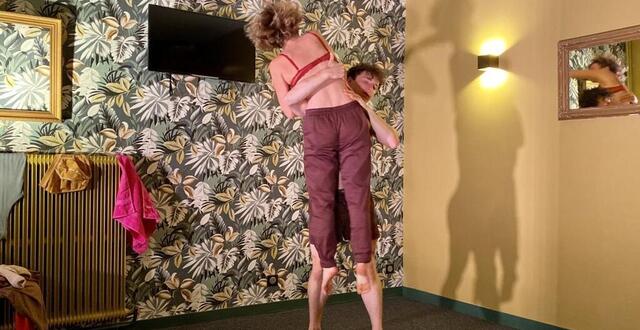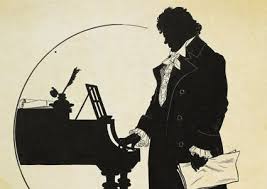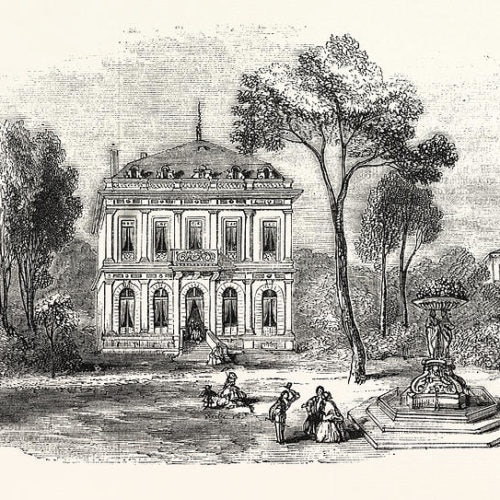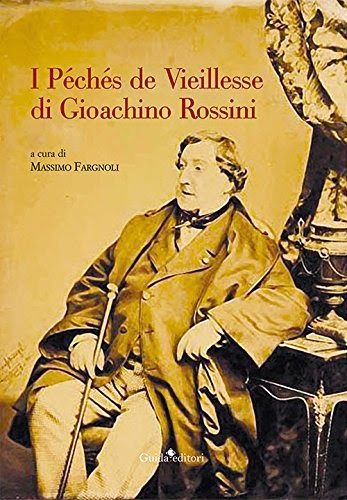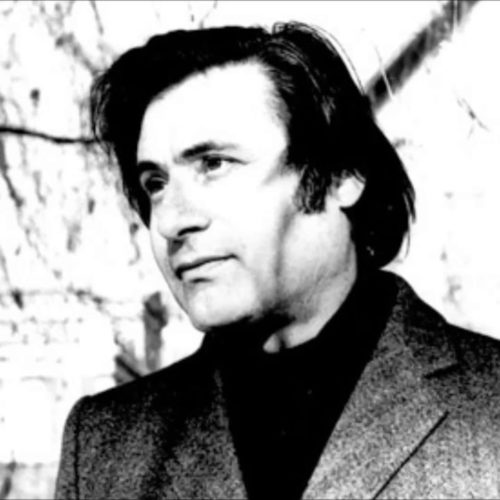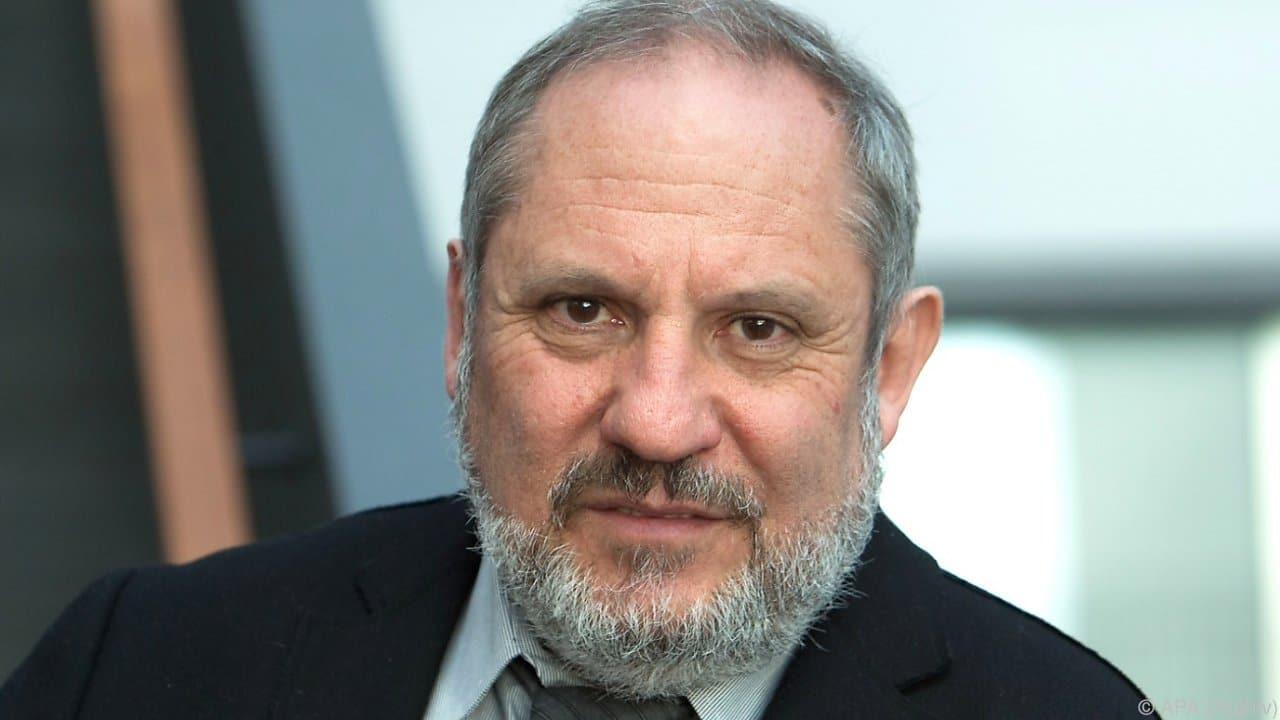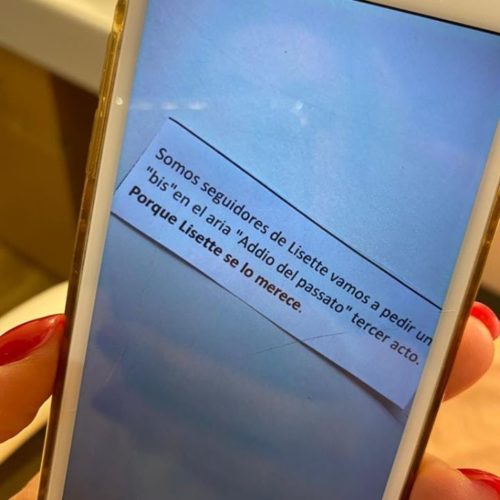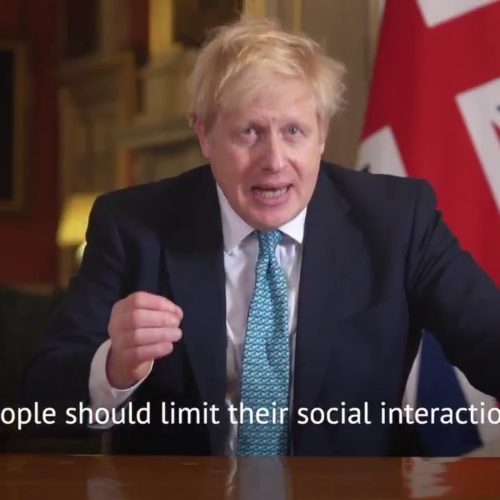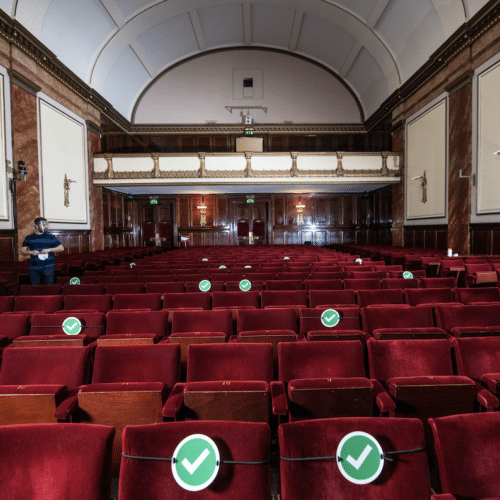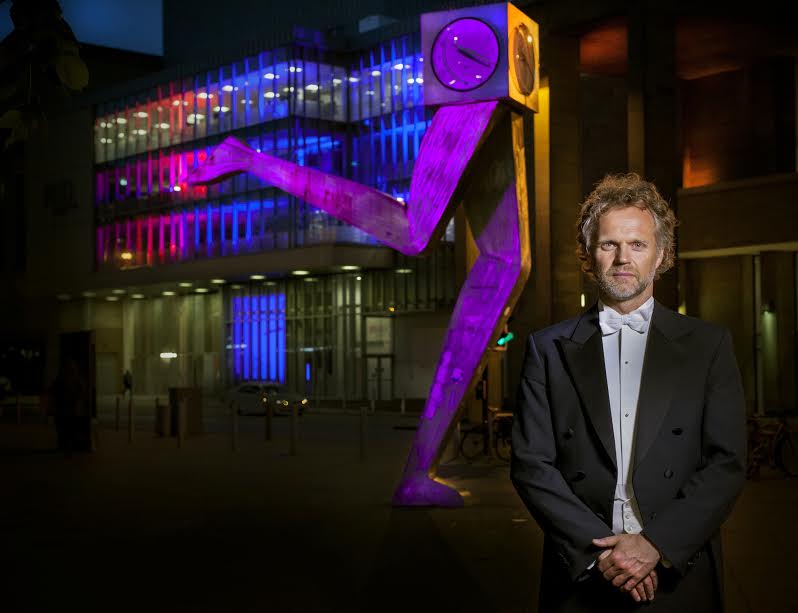The analytical methodology of the Viennese scholar Heinrich Schenker (1868-1935) has dominated academic musicology for so long that it is hardly possible to open a Beethoven score without thinking of his theories. Schenker, a decendant of Talmudists, is a powerful mind, always good to challenge. But the storm that has grippped US musicology this month has very little to do with his ideas.
It started with a lecture by the inflammatory Philip Ewell, a New York campaigner for ‘decolonising’ the music curriculum. Ewell gave a talk titled ‘Music Theory’s White Racial Frame‘ at the Society for Music Theory (SMT) Annual Meeting in November 2019 and debate has exploded since then with 100 pages of responses to Ewell’s lecture in the Journal of Schenkerian Studies.
All this would be worth little more than a raised eyebrow were it not for the odious undercurrents. Schenker was unarguably a supremacist when discussing European music. He was also xenophobe. These views are integral to the history and evolutuon of musicology and have been thoroughly exposed in many serious investigations such as….
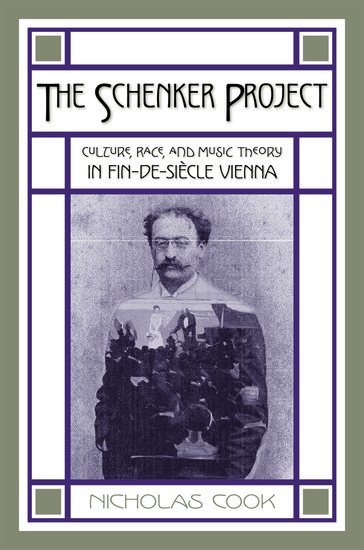
There was nothing new in Ewell’s attempted assassination, but his tone struck a different chord, provoking one of the journal’s editors, Timothy Jackson of the University of North Texas, to accuse Ewell of having an antisemitic agenda. ‘Ewell’s denunciation of Schenker and Schenkerians may be seen as part and parcel of the much broader current of Black anti-Semitism… including the pattern of violence against Jews, the obnoxious lyrics of some hip hop songs, etc.’
Ewell’s supporters rallied with this letter of support to the SMT: … The journal’s violation of academic standards of peer review, its singling out of Prof. Ewell while denying him a chance to respond, and the language of many of its essays constitute anti-Black racism. These actions provide further evidence of the structural force of white supremacy in our discipline. While this episode is the most recent, and perhaps the most illustrative, the treatment Prof. Ewell received from the Journal of Schenkerian Studies is only the latest instance of systemic racism that marginalized Society members have faced for many years.
We applaud the recent statement of the Executive Board of the Society for Music Theory. To aid the Executive Board in their aim to “determine further actions,” we the undersigned advocate for the following:
- A public statement from the President, authorized by the Executive Board and in accordance with the Policy on Public Statements, that SMT acknowledges the following three points: (a) that American music theory is historically rooted in white supremacy, the racist idea that whites are superior to nonwhites, (b) that these white supremacist roots have resulted in racist policies that have benefitted whites and whiteness while disadvantaging nonwhites and nonwhiteness, and (c) that these racist policies have resulted in injustices suffered by BIPOC at all stages of their careers. Further, we call upon the President, with the authorization of the Executive Board, to apologize to all BIPOC who have suffered such injustices, without equivocation.
Not since Stalin’s time have we seen such an orgy of self-criticism. I append the list of signatories from all over the world, practically the entire discipline of music theory, signing like sheep to self-slaughter. Here goes:
Rosa Abrahams, Ursinus College
Ruard Absaroka, University of Salzburg
Stefanie Acevedo, University of Dayton
Byron Adams, UC Riverside
George Adams, University of Chicago
Kyle Adams, Jacobs School of Music, Indiana University
Aisha Ahmad-Post, Colorado Springs, CO
Brian Alegant, Oberlin College Conservatory
Makulumy Alexander-Hills, Columbia University
Michael Allemana, University of Chicago
Emily Ruth Allen, Florida State University
Penrose Allphin, University of Massachusetts, Amherst
Andreas R. Amado, University of Texas Rio Grande Valley
Matt Ambrosio, Lawrence University
Drake Andersen, Vassar College
Clovis de Andre, Faculdade Cantareira (S√£o Paulo, Brazil)
Christopher Antila, RILM (Répertoire International de Littérature Musicale)
Spencer Arias, Michigan State University
Sean Atkinson, Texas Christian University
Robin Attas, Queen’s University
Jacqueline Avila, University of Tennessee
William R. Ayers, University of Central Florida
Andrew Aziz, San Diego State University
Ben Baker, Eastman School of Music
David John Baker, London, UK
Michael Baker, University of Kentucky
Sara Bakker, Utah State University
Twila Bakker, Edmonton, Alberta
Ellen Bakulina, University of North Texas
Lara Safinaz Balikci, McGill University
Marcos Balter, University of California, San Diego
Alyssa Barna, University of Minnesota
Jessica Barnett, SUNY Fredonia
Matthew Barnson, SUNY Stony Brook
Daniel Barolsky, Beloit College
Christopher Bartlette, Binghamton University
Samantha Bassler, New York University, Steinhardt Dept of Music and Performing Arts Professions
Eliot Bates, The Graduate Center, CUNY
Inessa Bazayev, Louisiana State University
Melinda Beasi, Easthampton, MA
Richard Beaudoin, Dartmouth College
Jennifer Beavers, University of Texas at San Antonio
Adam Behan, University of Cambridge
Owen Belcher, University of Missouri Kansas City
Matthew Bell, Tallahassee, FL
Vincent Pérez Benítez, Penn State University
Lauren Bennati, University of Wisconsin-Milwaukee
Michael Bennett, Graduate student, Stony Brook University
William Bennett, Harvard University
Zachary Bernstein, Eastman School of Music, University of Rochester
David Carson Berry, University of Cincinnati, College-Conservatory of Music
Michael Berry, University of Washington
Nilanjana Bhattacharjya, Arizona State University
Nicole Biamonte, McGill University
Ian Biddle, Newcastle University, UK
Benjamin Bierman, John Jay College, CUNY
Stefanie Bilidas, University of Texas at Austin
Sebastian Bisciglia, University of Toronto
Wendelin Bitzan, Robert Schumann Hochschule Düsseldorf, Germany
Nicolas Bizub, University of Cincinnati College-Conservatory of Music
Damian Blättler, Rice University
Andrew Blake, Eastman School of Music, University of Rochester
Chandler Blount, Florida State University
Michael S. Boerner, Stony Brook University
Breighan Boeskool, Granger, IN
Jacob Bohan, Charlotte, North Carolina
Christine Boone, University of North Carolina Asheville
David Borgo, UC San Diego
Mauro Botelho, Davidson College
Beau Bothwell, Kalamazoo College
Janet Bourne, University of California, Santa Barbara
Sara Bowden, Northwestern University
Lynette Bowring, Yale University
Douglas Boyce, George Washington University
Clifton Boyd, Yale University
Michael Boyd, Chatham University
Antares Boyle, Portland State University
Matthew Boyle, University of Alabama
Andre Bregegere, William Paterson University
David Bretherton, University of Southampton
Amelia Brey, The Juilliard School
Seth Brodsky, University of Chicago
Christopher Brody, University of Louisville
Per Broman, Bowling Green State University
Erin M. Brooks, State University of New York-Potsdam
Eliza Brown, DePauw University
Jenine Brown, Peabody Conservatory of the Johns Hopkins Univ.
Matthew Brown, Eastman School of Music
Michael Bruschi, Yale University
Michael Buchler, Florida State University
Carl Burdick, University of Cincinnati
Samantha Burgess, Ohio State University
Geoffrey Burleson, Hunter College-CUNY
L. Poundie Burstein, CUNY
Patricia Burt, University of Delaware
Mark J. Butler, Northwestern University
David Byrne, University of Manitoba
Thomas Cabaniss, The Juilliard School, New York, NY
Ian Calhoun, University of North Texas
Andrea Calilhanna, Western Sydney University, MARCS Institute for Brain, Behaviour and Development
Michael Callahan, Michigan State University
Lee Cannon-Brown, Harvard University
Ellon D Carpenter, Arizona State University, Emerita
Daphne GA Carr, NYU FAS Music
Carolyn Carrier, Philadelphia, PA
James Carroll, Springfield, MA
Rebecca Carroll, Rutgers University
Daniel Carsello, Temple University
Antonio Cascelli, Maynooth University
James P Cassaro, University of Pittsburgh
Zosha Di Castri, Columbia University
Devin Chaloux, New Hampshire
Samuel Chan, New York University
Varun Chandrasekhar, The University of Minnesota
Dustin Chau, University of Chicago
Damian Cheek, University of Arkansas – Fort Smith
Timothy K. Chenette, Utah State University
William Cheng, Dartmouth College
Adrian P. Childs, University of Georgia
Matt Chiu, Eastman School of Music
Hiroaki Cho, Brown University
Andrew Chung, University of North Texas
Amy Cimini, UC San Diego
Alice Clark, Loyola University New Orleans
Timothy Clarkson, Sydney Conservatorium of Music, Sydney University DMA candidate
Seth Cluett, Columbia University
Jacob A. Cohen, Oberlin College
Christa Cole, Indiana University
Carla Colletti, Webster University
Adam Collins, University of Montana
Henri Colombat, McGill University
John Combs, Florida State University
Jade Conlee, Yale University
Corrina Connor, Victoria University of Wellington, New Zealand
Karen M. Cook, University of Hartford
Robert C. Cook, Louisville CO (University of Iowa, emeritus)
Margaret Cormier, McGill University
Evan Cortens, Mount Royal University
Nicole Cosme, Yale University
Alyssa Cottle, Harvard University
Benjamin Court, UCLA
Alexander Cowan, Harvard University
Arnie Cox, Oberlin College & Conservatory
Maxe Crandall, Stanford University
Stephen A. Crist, Emory University
Alejandro Cueto, University of Texas at Austin
Nick Curry, Harvard Law School
David Damschroder, University of Minnesota
Joe Davies, University of Oxford
Angharad Davis, Yale University
Stacey Davis, University of Texas at San Antonio
Hannah Davis-Abraham, University of Toronto
Laina Dawes, Columbia University
Greg Decker, Bowling Green State University (Ohio)
Kyle DeCoste, Columbia University
Rob Deemer, State University of New York at Fredonia
Galen DeGraf, Columbia University
Tomoko Deguchi, Winthrop University
Jay Derderian, Composer – Portland, Oregon
Johanna Devaney, Brooklyn College and CUNY Graduate Center
Dana DeVlieger, University of Delaware
David Dewar, University of Bristol, UK
Emily DeWoolfson, Temple University
Thomas Dickinson, South Carolina Governor’s School for the Arts and Humanities
Brittni Leigh Dixon, Florida State University
Benjamin Dobbs, Furman University
Julia Doe, Columbia University
James Donaldson, McGill University
Sahara Donna, University of North Texas
Luka Douridas, RILM (Répertoire International de Littérature Musicale)
Eric Drott, University of Texas at Austin
Aleksandra (Sasha) Drozzina, Toronto, ON
Daniel Nicolae Dubei, New York City, NY
Michéle Duguay, The Graduate Center, CUNY
Ben Duinker, University of Toronto
Philip Duker, University of Delaware
Melissa Dunphy, Rutgers University
Jonathan Dunsby, Eastman School of Music
Jacques Dupuis, Brandeis University
Michael Ebie, Michigan State University
Ryan Ebright, Bowling Green State University
Lindsey Eckenroth, Brooklyn College, CUNY
Ethan Edl, Yale University
Laura Emmery, Emory University
Neal Endicott, Michigan State University
Christopher Endrinal, Florida Gulf Coast University
Clare Sher Ling Eng, Belmont University
Nora Engebretsen, Bowling Green State University
Tom Erbe, UC San Diego
Walter Everett, University of Michigan
Sara Everson, Florida State University
Philip Ewell, Hunter College
Samuel Falotico, University of Colorado Boulder
David Falterman, Eastman School of Music, University of Rochester
Tobias Fasshauer, Berlin University of the Arts
Brent Ferguson, Washburn University and MidAmerica Nazarene University
Matthew Ferrandino, University of Kansas
Stanley Ralph Fink, Florida State University
Aaron Flagg, The Juilliard School
Amy Fleming, Baylor University
Nathan Fleshner, University of Tennessee
J. Wesley Flinn, University of Minnesota Morris
Rebecca Flore, University of Chicago
David Walter Floyd, Champaign, IL
Gretchen Foley, University of Nebraska-Lincoln
Mike Ford, Columbia University
Jane Forner, Columbia University
Karen Fournier, University of Michigan @ Ann Arbor
Aaron Andrew Fox, Dept. of Music, Columbia University
Elizabeth Fox, University of Toronto
Kelly Francis, Kennesaw State University
Kristin M. Franseen, Carleton University and University of Ottawa
Walter Frisch, Columbia University
Louise Fristensky, The University of North Texas
Johanna Frymoyer, University of Notre Dame
Anna Fulton, Grand Valley State University
Alison Furlong, Columbus, OH
Joshua Gailey, Seattle, WA
Rachel Gain, University of North Texas
Michael Gallope, University of Minnesota
Sarah Gates, Northwestern University
Leslie Gay, University of Tennessee, Knoxville
David Geary, Wake Forest University
William van Geest, University of Michigan
Ian Gerg, Southeastern Oklahoma State University
Sarah Gerk, Binghamton University
Emily Gertsch, University of Georgia
Elaine Fitz Gibbon, Harvard University
Jeffrey L. Gillespie, Butler University
Mylene Gioffredo, Universite de Metz
Jon-Tomas Godin, Brandon University
Keir GoGwilt, UC San Diego
Daniel Goldberg, University of Connecticut
Halina Goldberg, Indiana University Bloomington
Rachel May Golden, University of Tennessee
K. E. Goldschmitt, Wellesley College
Grace Gollmar, University of Texas at Austin
Stephen Gomez-Peck, The Graduate Center, CUNY
Juan Gonzalez, Alumni
Sumanth Gopinath, University of Minnesota Twin Cities
Stephen Gosden, University of North Florida
Gillian L. Gower, University of Denver/University of Edinburgh
Naomi Graber, University of Georgia
Thomas Gracy, Boston University
Benjamin Graf, University of North Texas
Aaron Grant, Missouri Western State University
Roger Mathew Grant, Wesleyan University
Julianne Grasso, University of Texas at Austin
Ashley A. Greathouse, PhD Candidate, University of Cincinnati
Andrew Green, University of Glasgow
Stefan Greenfield-Casas, Northwestern University
phillip greenlief, composer, improviser, teacher – oakland, ca
Jess Griggs, Austin, TX
Robert Gross, Board Certified Music Therapist, Denton, TX
Michelle L Grosser, University of Toronto
Bree Kathleen Guerra, University of Texas at Austin
Jeannie Ma. Guerrero, Rochester, NY
Massimo Guida, Toronto
Stephanie Gunst, independent scholar, Charlottesville, VA
Sara Haefeli, Ithaca College, Editor of the Journal of Music History Pedagogy
Zaki Hagins, Conservatorium Maastricht
Lauren Halsey, University of Washington
Elizabeth Hambleton, UCSB
Chelsey Hamm, Christopher Newport University
Scott Hanenberg, Virginia Tech
Mena Mark Hanna, Barenboim-Said Akademie, Berlin
Calder Hannan, Columbia University
Kristi Hardman, The Graduate Center, CUNY
J. Tanner Harrod, Graduate Student, University of Nebraska-Lincoln
Lauren Hartburg, Florida State University
Robert Hasegawa, McGill University
Amy Hatch, University of North Texas/University of Texas at Arlington
Stan Hawkins, University of Oslo and University of Agder, Norway
Midavi Hayden, Independent Artist-Scholar; Cincinnati, OH
Martin Hebel, University of Cincinnati College-Conservatory of Music
Garrett Hecker, Santa Fe College (Gainesville, FL)
Nicola Leonard Hein, Columbia University New York
David Heinsen, University of Texas at Austin
Bill Heinze, University of Minnesota
Matthias Heyman, University of Antwerp, Belgium
Andrew Hicks, Cornell University
Orit Hilewicz, Eastman School of Music
Ann Hiloski-Fowler, West Chester University of Pennsylvania
Hubert Ho, Northeastern University
Jocelyn Ho, UCLA
Kevin Holm-Hudson, University of Kentucky
Julian Bennett Holmes, Manhattan School of Music; Columbia University
Heather Holmquest, Nazareth College
Knut Holtstraeter, University of Freiburg, Germany
Tanya Honerman, University of Kansas
Erika Supria Honisch, Stony Brook University
Jason Hooper, University of Massachusetts Amherst
Fred Hosken, Northwestern University
Rachel Hottle, McGill University
Blake Howe, Louisiana State University
Alison Howell, Rutgers University
Amanda Hsieh, University of Toronto
Daniel Huang, University of Cincinnati College-Conservatory of Music
Stephen S. Hudson, University of Richmond
Bryn Hughes, The University of Lethbridge
Tim Hughes, The London College of Music
Kyle Hutchinson, NA
Liam Hynes-Tawa, Yale University
Sarah Iker, Massachusetts Institute of Technology
Mark Inchoco, University of California, Riverside
Tom Ingram, Winnipeg, MB
Lauren Irschick, Eastman School of Music
Eric Isaacson, Indiana University Jacobs School of Music
Velia Ivanova, Columbia University
Roman Ivanovitch, Indiana University
Jennifer Iverson, University of Chicago
Joseph Jakubowski, Harvard University
Donald James, Boston College
Mark Janello, Peabody Conservatory, Johns Hopkins University
Freya Jarman, University of Liverpool, UK
J. Daniel Jenkins, University of South Carolina
Stephanie Jensen-Moulton, Brooklyn College, CUNY
Emily John, Special Music School, NYC, Queens College – CUNY
James A. John, Professor of Music, Aaron Copland School of Music, Queens College-CUNY
Lindsay Johnson, University of Maryland, Baltimore County
Tom Johnson, contingent faculty
Erin Johnson-Williams, Durham University
Blair Johnston, Indiana University
Erin Johnston, The Graduate Center, CUNY
Evan Jones, Florida State University
Alexandrea Jonker, McGill University
Patricia Julien, University of Vermont
Sylvia Kahan, College of Staten Island and Graduate Center, CUNY
Elyse Kahler, University of Texas at Arlington
Noah Kahrs, Eastman School of Music
Peter Kaminsky, University of Connecticut – Storrs
Robert T. Kelley, Lander University
Laura L. Kelly, University of Texas at San Antonio
Colin Kennedy, Washington, DC
Matthew Kennedy, University of South Florida
Emily Kenyon, South Country Central School District
Marissa Kerbel, University of Cincinnati
Linda Kernohan, DMA Composition student, The Ohio State University; Adjunct Professor, Otterbein University
Daniel Ketter, Daniel Ketter
Dr. Ildar D. Khannanov, Peabody Institute, Johns Hopkins University
Wes Khurana, University of Toronto
Marianne Kielian-Gilbert, Indiana University
Jesse Kinne, Louisiana Tech University
Jesse Kiser, University at Buffalo
Michael L. Klein, Temple University
Joshua Klopfenstein, University of Chicago
Edward Klorman, McGill University
Andrew J Kluth, Case Western Reserve University
Douglas Knehans, College-Conservatory of Music, Cincinnati, OH
Andrew Knight-Hill, University of Greenwich, UK
Kristina Knowles, Arizona State University
Jon Kochavi, Swarthmore College
Tatiana Koike, Yale University
Robert Komaniecki, University of Iowa
Ryan Kosseff-Jones, Geneva, NY
Stephen M. Kovaciny, Madison, WI
Mariusz Kozak, Columbia University
Reiner Krämer, University of Northern Colorado
Joseph Kraus, Florida State University
Hanisha Kulothparan, Michigan State University
Jonathan Kulp, University of Louisiana at Lafayette
Anita Kumar, Georgia State University
Jaclyn Noel Kurtz, Cuyahoga Falls, Ohio
Eduardo Lopez-Dabdoub, Florida State University
Darren A. LaCour, Lindenwood University
Eric Lai, Baylor University
Hei-Yeung John Lai, University of British Columbia
steven laitz, the Juilliard School
George Tsz-Kwan Lam, Hong Kong Baptist University
Nathan Lam, Massachusetts Institute of Technology
Heather Laurel, Independent Scholar (Mannes/CUNY Alum)
Justin Lavacek, University of North Texas
Megan Lavengood, George Mason University
TJ Laws-Nicola, University of Kansas
Kara Yoo Leaman, Oberlin College & Conservatory
Dickie Lee, University of Georgia
Gavin Lee, Soochow University
Frank Lehman, Tufts University
Marc LeMay, Georgia State University
Jordan Lenchitz, Florida State University
Rebecca Lentjes, RILM Abstracts of Music Literature
Kendra Preston Leonard, Silent Film Sound and Music Archive
Stephen Lett, University of Saskatchewan
Anne Levitsky, Dixie State University
Tamara Levitz, UCLA
Benjamin R. Levy, University of California, Santa Barbara
Michael Lewanski, Depaul University, School of Music
Edwin Li, Harvard University
Siv B. Lie, University of Maryland
Stephen F. Lilly, Minneapolis, MN
Stephanie Lind, Queen’s University (Canada)
Peng Liu, University of Texas at Austin
Zachary Lloyd, Florida State University
Judy Lochhead, Stony Brook University
James A. Long, Oakland University
Megan Long, Oberlin College
Rebecca J. Long, University of Louisville
Gerardo (Gerry) Lopez, Michigan State University
Sarah Louden, New York University Steinhardt
Gabriel Lubell, Indiana University Jacobs School of Music
Ann E Lucas, Associate Professor of Music, Boston College
Olivia R. Lucas, Louisiana State University
Nicholas Luciano, Greensboro, NC
Rachel Lumsden, Florida State University
Justin Lundberg, Chicago
Siriana Lundgren, Harvard University
Vivian Luong, University of Saskatchewan
Matthew Lyons, University of Texas at Austin
Megan Lyons, University of Connecticut
Yiqing Ma, University of Michigan
James MacKay, Loyola University New Orleans
Barbara Dobbs Mackenzie, RILM, Brook Center, CUNY Graduate Center
Alejandro L. Madrid, Cornell University
Andrus Madsen, Newton Baroque
Erin K. Maher, Delaware Valley University
Su Yin Mak, The Chinese University of Hong Kong
Victoria Malawey, Macalester College (St. Paul, MN)
Anabel Maler, University of Iowa
Noriko Manabe, Temple University
Kate Mancey, Harvard University
Rachel Mann, University of Texas Rio Grande Valley
Dr. Nicole Marchesseau, McMaster University
Elizabeth Margulis, Princeton University
Sarah Marlowe, Eastman School of Music
Jennifer Martin, University of Wisconsin-Milwaukee
Caitlin Martinkus, Virginia Tech
David Marvel, University of Oklahoma
William Marvin, Eastman School of Music
Will Mason, Wheaton College
Steven D. Mathews, University of Cincinnati
Fred Everett Maus, Department of Music, University of Virginia
Paula Maust, University of Maryland, Baltimore County
Panayotis Mavromatis, New York University
Susan McClary, Case Western Reserve University
Ryan McClelland, University of Toronto
Michael McClimon, Philadelphia, PA
Sarah McConnell, University of Alaska Fairbanks
Stephen McFall, Indiana University
Claire McGinn, University of York
Eric McKee, Penn State University
Elizabeth McLain, Virginia Tech
Andrew Mead, Indiana University
Elizabeth Medina-Gray, Ithaca College
Sarah Mendes, University of Texas at Austin
Sadie Menicanin, University of Toronto
Lila Meretzky, Yale University
Garrett Michaelsen, University of Massachusetts Lowell
Jason Louis Mile, London, ON
Emily Milius, University of Oregon
Natalie Miller, Princeton University
McKensie Miller, Chapman University
Connor Milstead, St. Mary’s College of Maryland
Helen Julia Minors, Kingston University, London
Nathaniel Mitchell, Princeton University
Toru Momii, Columbia University
Dayna Mondelli, Independent Proofreader and Copyeditor
Peter Mondelli, University of North Texas
Eugene Montague, George Washington University
Steven Moon, University of Pittsburgh
Alexander Morgan, New York
Kacie Morgan, UCLA
Landon Morrison, Harvard University
Brian Moseley, SUNY Buffalo
Tahirih Motazedian, Vassar College
Andre Mount, Crane School of Music, SUNY Potsdam
Reinaldo Moya, Augsburg University, Minneapolis, Minnesota
Stephen Muir, University of Leeds, UK
Alana Murphy, CUNY Graduate Center/ RILM
Barbara Murphy, University of Tennessee-Knoxville
Estelle Murphy, Maynooth University, Ireland
Nancy Murphy, University of Houston
Scott Murphy, University of Kansas
Derek J. Myler, Eastman School of Music
Jessica Narum, Baldwin Wallace University
Meghan Naxer, Oregon State University
Jocelyn Neal, University of North Carolina at Chapel Hill
Dr. Lisa Neher, Portland, OR
Christoph Neidhöfer, McGill University
Trevor R. Nelson, Eastman School of Music–University of Rochester
Joshua Neumann, University of Florida
Bryce Newcomer, Xavier University
Neil Newton, Los Angeles, CA
Patrick Nickleson, Queen’s University
Demi Nicks, The Graduate Center, CUNY
Maggie Nicks, Florida State University
Jack Haig Nighan, Indiana University
Drew Nobile, University of Oregon
Shaugn O’Donnell, The City College, CUNY
William O’Hara, Gettysburg College
Russell O’Rourke, Columbia University
Jennifer Oates, Queens College, CUNY
Chelsea Oden, University of Oregon
Judith Ofcarcik, Fort Hays State University
Mitch Ohriner, University of Denver
Hideaki Onishi, Singapore
Dani Van Oort, University of North Texas
Jeremy Orosz, University of Memphis
David Orvek, Indiana University
Mariam Osman, Indiana University
Anna-Elena Pääkkölä, Åbo Akademi University, Finland
Kirsten Paige, Stanford University
Cora S. Palfy, Elon University
James Palmer, Vancouver, Canada
Hyeonjin Park, UCLA
Jinny Park, Indiana University
Sarah Parkin, London, UK
Laurel Parsons, University of Alberta
Daniel Partridge, Portland State University
Morgan Patrick, Northwestern University
Andrew Pau, Oberlin College & Conservatory
Robert D. Pearson, Emory University
William Pearson, DePauw University
Jacy Pedersen, University of Cincinnati
Julie Pedneault-Deslauriers, University of Ottawa
Crystal Peebles, Ithaca College
Nathan Pell, The Graduate Center, CUNY, and Mannes College
Rich Pellegrin, University of Florida
Anna C. Peloso, Indiana University, Jacobs School of Music
Naomi Perley, RILM
Becky Perry, Lawrence University
Jeffrey Perry, Louisiana State University
Lukas Perry, Eastman School of Music, University of Rochester
Miriam Piilonen, Northwestern University
John R. Pippen, Colorado State University
Cayenna Ponchione-Bailey, University of Oxford
Ève Poudrier, University of British Columbia
Andrew S. Powell, Independent Scholar (University of Kansas alum)
Sarah Pozderac-Chenevey, Independent scholar, Akron, OH
Roxane Prevost, University of Ottawa
Simon Prosser, The Graduate Center, CUNY
Joel Puckett, Peabody Conservatory, Johns Hopkins University
Katherine Pukinskis, Amherst College
Michael Puri, University of Virginia
Steven Rahn, University of Texas at Austin
Richard Randall, Carnegie Mellon University
Jacob Reed, University of Chicago
S. Alexander Reed, Associate Professor, Ithaca College
John S. Reef, Nazareth College
Sam Reenan, Eastman School of Music
Alex Rehding, Harvard University
Molly Reid, Appalachian State University
Anne-Marie Reynolds, Juilliard School
Christopher Reynolds, UC Davis
Mark Richardson, East Carolina University
Melanie Richter-Montpetit, University of Sussex
Deborah Rifkin, Ithaca College
Steven Rings, University of Chicago
Marianna Ritchey, University of Massachusetts, Amherst
Blake Ritchie, Rutgers University
S R I Rizvi, Sahibganj College Sahibganj Jharkhand India
Malia Jade Roberson, California State University, Channel Islands
Brian Robison, Northeastern University
Joti Rockwell, Pomona College
Stephen Rodgers, University of Oregon
Jillian C. Rogers, Indiana University
Lynne Rogers, Mannes School of Music at The New School
J. Griffith Rollefson, University College Cork
Jena Root, Youngstown State University (Ohio)
Adam Rosado, Iona College
Joshua Rosner, McGill University
Jade Roth, McGill University
Charles Roush, University of Texas Rio Grande Valley
Katrina Roush, University of Texas Rio Grande Valley
Toby W. Rush, University of Dayton
Declan Ryan, DePaul University School of Music
Eron F. S., Eastman School of Music
Olga Sanchez-Kisielewska, University of Chicago
Siavash Sabetrohani, University of Chicago
Alex Sallade, The Ohio State University
Mark Sallmen, University of Toronto
Frank Samarotto, Indiana University Bloomington
Lanier Sammons, California State University, Monterey Bay
Alexander Sanchez-Behar, Texas A&M University-Kingsville
Giorgio Sanguinetti, University of Rome \Tor Vergata\””
Matthew Leslie Santana, UC San Diego
Matthew C. Saunders, Lakeland Community College (Kirtland, Ohio)
Isaac Schankler, Cal Poly Pomona
Alexandria Schneider, University of Kansas
Katherine Schofield, King’s College London
Matthew D. M. Schullman, University of Oklahoma (Norman)
Scott Schumann, Central Michigan University
Emily Schwitzgebel, Northwestern University
Jo Collinson Scott, Reader in Music, University of the West of Scotland
Travis Scott, Xavier University of Louisiana
Tyler M. Secor, University of Cincinnati College Conservatory of Music
Chris Segall, University of Cincinnati
Marianne Segall, Mississauga, Ontario Canada
Kate Sekula, University of Science and Arts of Education
Ian Sewell, Columbia University
Kayla Shaeffer, Florida State University
Jennifer Shafer, University of Delaware
Daniel Shanahan, The Ohio State University
August A. Sheehy, Stony Brook University
Braxton D. Shelley, Harvard University
Joel T. Shelton, Elon University
Lauren Shepherd, Columbia University
Rachel Short, Shenandoah Conservatory
Tessa Shune, Chapman University
Abigail D. Shupe, Colorado State University
Max Silva, University of Chicago
Rebecca Simpson-Litke, University of Manitoba
Peter Sloan, UC San Diego
Jeremy W. Smith, University of Louisville
Kelli Smith-Biwer, University of North Carolina – Chapel Hill
Sean R. Smither, The Juilliard School
Jennifer Snodgrass, Appalachian State University
Danielle Sofer, LGBTQ+ Music Study Group
Emma Soldaat, University of Toronto
Jason Solomon, Agnes Scott College
Jessica Sommer, Ball State University
Jonathan De Souza, University of Western Ontario
Stephen Spencer, The Graduate Center, CUNY
Mark Spicer, Hunter College and the Graduate Center, CUNY
Scott Spiegelberg, DePauw University
Martha Sprigge, University of California, Santa Barbara
Ron Squibbs, University of Connecticut
Jonathan Arthur Stallings, University of California San Diego
Anna Stephan-Robinson, West Liberty University
Bryan Stevens, University of North Texas
Daniel Stevens, University of Delaware
Joseph Stiefel, Indiana University
Philip Stoecker, Hofstra University
Nicholas Stoia, Duke University
Jordan Carmalt Stokes, West Chester University of Pennsylvania
Chris Stover, Griffith University
Eva-Maria van Straaten, Georg-August University Göttingen, Germany
Jeremy Strachan, Queen’s University
Joseph Straus, CUNY Graduate Center
Ofir Stroh, Blair School of Music
Cara Stroud, Michigan State University
Greg Stuart, University of South Carolina
Jacob David Sudol, Florida International University
Rina Sugawara, University of Chicago
James Sullivan, Michigan State University
Peter M. Susser, Columbia University
Kaitlyn Swaim, University of North Texas
Kevin Swinden, Wilfrid Laurier University
Kelly Symons, Ottawa
Victor Szabo, Hampden-Sydney College
Lina Sofia Tabak, CUNY Graduate Center
Carlos Pérez Tabares, University of Michigan
Daphne Tan, University of Toronto
Ivan Tan, Brown University
Nicholas Ivan Tapia, St. Mary’s University (Music Education)
Jeremy Tatar, McGill University
Benjamin Tausig, SUNY Stony Brook
Ryan Taycher, Roosevelt University
Blake Taylor, University of Connecticut
Charles Taylor, University of New Orleans
Emma Taylor, The Hartt School at the University of Hartford
Timothy D. Taylor, UCLA
Wilfrido Terrazas, University of California, San Diego
Loretta Terrigno, The Juilliard School
Bryan Terry, McGill University
Florian Thalmann, Kyoto University
Midge Thomas, Connecticut College
Sean Emmett Thompson, Graduate in Music Composition, San Francisco State University
Alexis Millares Thomson, University of Toronto
Emmi Tinajero, University of North Texas
Sylvie Tran, University of Michigan
Emily Lamb Truell, Indiana University
Tobias Tschiedl, McGill University
Cynthia Johnston Turner, University of Georgia
Isabel Tweraser, Florida State University
Kristian Twombly, Chair, St Cloud State University
Elizabeth Randell Upton, UCLA
Steven Vande Moortele, University of Toronto
Stephanie Venturino, Eastman School of Music
Vivek Virani, University of North Texas
Samantha Waddell, Michigan State University
Ben Wadsworth, Kennesaw State University
Steve Waksman, Smith College
Kristen Wallentinsen, Rutgers University
Levi Walls, University of North Texas
Jordan Walsh, University of Texas at Austin
Anna, Yu Wang, Harvard University
Aleisha Ward, National Library of New Zealand
Evan Ware, California State Polytechnic University, Pomona
Lindsay Warrenburg, Boston, MA
Hannah Waterman, Stony Brook University
Laura Watson, Maynooth University, Ireland
Miriam Brack Webber, Bemidji State University
Katelin Webster, The Ohio State University
Joelle Welling, University of Calgary
Robert Wells, University of Mary Washington
Allison Wente, Elon University
Marianne Wheeldon, University of Texas at Austin
Andrew Malilay White, University of Chicago
Christopher White, University of Massachusetts Amherst
Anya Wilkening, Columbia University
Ann Marie Willer, (formerly) University of North Texas
Dr. Natalie Williams, (formerly) North Park University
Jeff Williams, Harvard University
Justin Williams, University of Bristol (UK)
Matthew Williams, University at Buffalo
Ruthie Williamson, Indiana University Kelley School of Business
Julianna Willson, Eastman School of Music
Lauren Wilson, Eastman School of Music
Elizabeth L. Wollman, Baruch College, CUNY
Chelsea N Wright, University of Oregon
Robert B. Wrigley, The Graduate Center, CUNY
Alice Xue, CUNY
Jessica Findley Yang, University of Tennessee – Knoxville
Rachel Yoder, DigiPen Institute of Technology
Michelle Yom, CUNY Graduate Center
Jeff Yunek, Kennesaw State University
Jason Yust, Boston University
Anna Zayaruznaya, Yale University
Emily Zazulia, University of California, Berkeley
Lawrence Zbikowski, University of Chicago Department of Music
Rosalind Zhang, Toronto
Shelley Zhang, University of Pennsylvania
Xieyi (Abby) Zhang, Georgia State University
Julie Zhu, Stanford University
